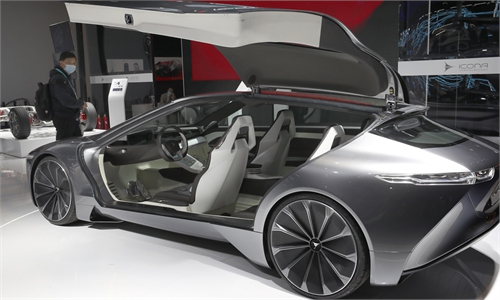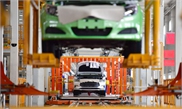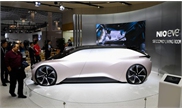China's three leading domestic electric car makers record above 350% sales growth in January

Aerial photo taken on Nov. 30, 2018 shows a "charging tower" for electric vehicles at the headquarters of Chinese carmaker BYD in Shenzhen, south China's Guangdong Province. China has established the world's most comprehensive new energy vehicle (NEV) supporting system, Huang Libin, spokesman with the Ministry of Industry and Information Technology, said at a recent news conference. During the first quarter, China's NEV production and sales amounted to 304,000 and 299,000 vehicles respectively, up 102.7 percent and 109.7 percent. Photo: Xinhua
Leading Chinese electric car brands recorded eye-watering sales growth in January, with all the three leading mainland new energy vehicle (NEV) makers -- Li Xiang, NIO and Xiaopengrecording sales growth above 350 percent.
Experts said that such growth is encouraging as it showed domestic NEV market remains in a high growth phrase, but such growth is not fast enough giventhe companies' market valuations.
The Beijing-based car maker Li Xiang announced that it delivered 5,379 electric SUVs Li Xiang One in January, up 355.8 percent year-on-year. In total, the company delivered 38,976 Li Xiang One cars this calendar year.
The firm also announced the establishmentof a research and development center in Shanghai, which will specialize in the research of electric car technologies such as autonomous driving tech and next-generation intelligent cockpit technologies.
Domestic electric car brand NIO delivered 7,225 new cars in January, up by 352.1 percent on a yearly basis and setting new records for single-month deliveries fora consecutivesix-month period.
In comparison, XiaopengMotors delivered 6, 015 cars in January, up from 5, 700 deliveries in December and growing 470 percent on a yearly basis.
Independent automobile car analyst Feng Shiming said that those companies are still enjoying a period of high-speed growthin a general "incremental" electric car market, but such growth is still not fast enough considering their respective market valuations.
China has set a goal that sales of electric vehicles should account for about one fifth of the country's total car sales by the year of 2025. To achieve that goal, electric car market should growat least by 30 percent each year for the next five years, which Feng said is not easy to achieve considering the current development speed.
"The electric car market still has downsiderisks, including false advertising and low performance in cold weather. The rapid development of Tesla in China also squeezed the space for domestic brands," Feng told the Global Times. He predicted that China's electric car market could achieve double-digit growth this year.
Tesla revealed recently that its adjusted fourth-quarter profit was valued at 80 cents per share, falling short of market estimate of $1.03 per share.
However, overseas organizations were still upbeat about domestic NEV makers' business projects, for reasons such as mainland drivers' growing penchant for electric cars. For example, Morgan Stanley forecast in a recent report that it is likely to post a profit for the first time and double its revenue this year. It also expected Li Xiang to turn a maiden profit this year.
Global Times



